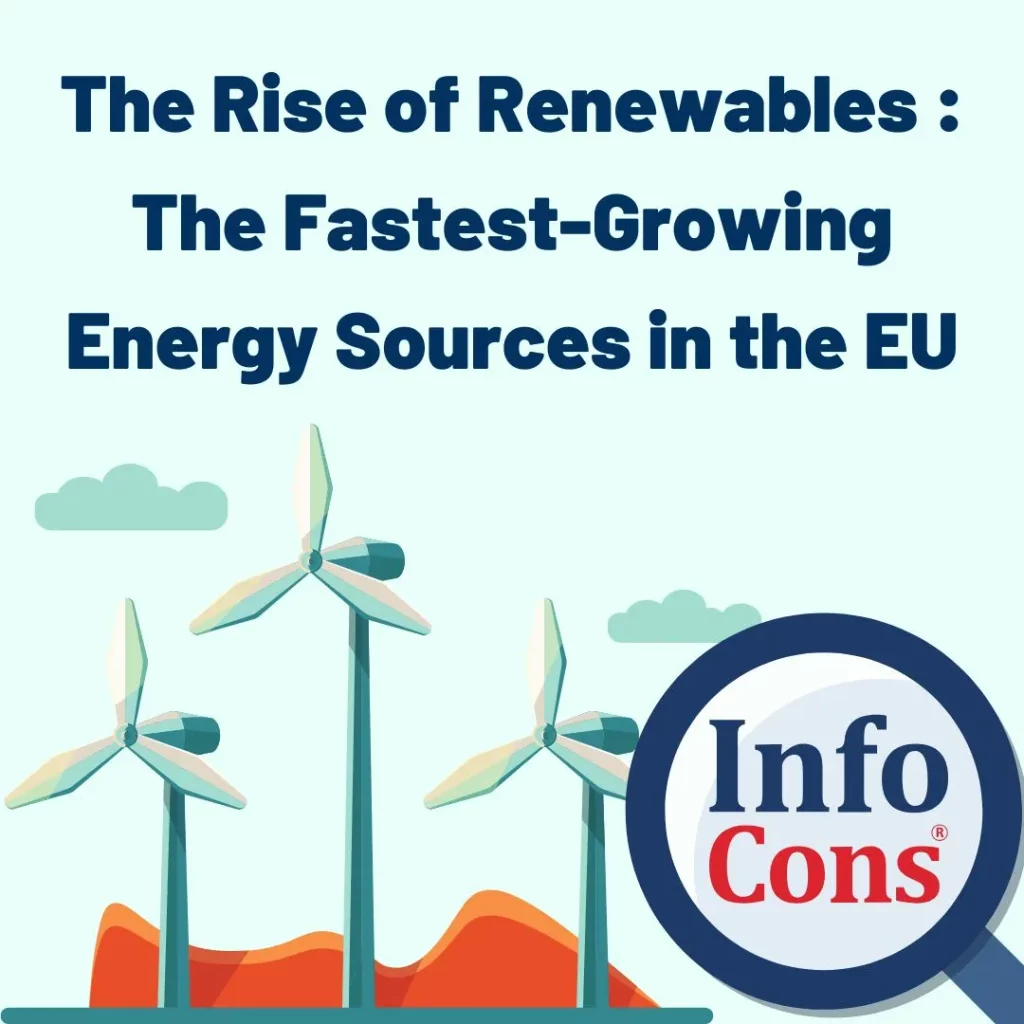
In 2023, the European Union experienced a historic surge in renewables, marking a record-breaking year for energy production from sustainable sources. With a substantial increase in the share of clean energy, the EU continued its transition toward a greener and more resilient power system.
Renewable energy accounted for 45.3% of the EU’s total electricity consumption, reflecting a 4.1 percentage-point (pp) rise from 2022. This significant growth in renewables represents the largest annual increase recorded since 2004, surpassing previous jumps in 2022 (3.5 pp) and 2020 (3.3 pp). The rapid expansion of wind and solar power played a key role in this milestone.
Wind and Solar Lead the Growth of Renewables in 2023
The surge in renewables was primarily driven by wind and solar energy, which accounted for the majority of the EU’s clean electricity production.
- Wind energy remained the top source, generating 38.5% of total renewable electricity.
- Hydropower contributed 28.2%, playing a vital role in the EU’s renewable energy mix.
- Solar energy continued its rapid rise, supplying 20.5% of the total renewable electricity output.
Solar energy has seen extraordinary growth over the past decade. In 2008, it accounted for only 1% of renewable energy production (7.4 terawatt-hours or TWh), but by 2023, solar energy had surged to 252.1 TWh, making it the fastest-growing renewable power source in Europe.
Other renewables, including solid biofuels (6.2%) and other renewable energy sources (6.6%), further contributed to the EU’s shift toward sustainable power.
Read also : How the EU Secured a € 27.2 Billion Trade Surplus in Late 2024 – InfoCons Consumer Protection keeps you informed !
Top Renewable Energy Performers: Austria, Sweden, and Denmark
While the EU as a whole saw a sharp increase in renewables, some countries stood out as leaders in renewable energy consumption. In 2023, three countries generated more than 75% of their electricity from renewables:
- Austria: 87.8% (primarily from hydropower)
- Sweden: 87.5% (a mix of hydro and wind energy)
- Denmark: 79.4% (mostly wind energy)
These nations have demonstrated how strong investments in renewable energy can lead to a sustainable and efficient power system.
Countries Where Renewable Energy Makes Up More Than 50%
Several other EU nations also surpassed the 50% renewable energy mark:
- Portugal – 63.0%
- Croatia – 58.8%
- Spain – 56.9%
- Latvia – 54.3%
- Finland – 52.4%
Their commitment to renewables highlights a growing shift toward clean energy and reduced dependence on fossil fuels.
Read also : How to Reduce Your Risk of Breast Cancer – Prevention Tips
Where Is Renewable Energy Adoption Still Lagging?
Despite the impressive growth in renewables, some EU countries continue to lag behind in renewable energy adoption. In 2023, four nations produced less than 20% of their electricity from renewables:
- Malta – 10.7%
- Czechia – 16.4%
- Luxembourg – 18.0%
- Hungary – 19.5%
These countries face obstacles such as limited renewable energy infrastructure, slower policy implementation, and geographical constraints. However, with the right investments and incentives, they have the potential to expand their renewables sector in the coming years.
The Future of Renewable Energy in Europe
The record-breaking expansion of renewables in 2023 highlights Europe’s progress toward a clean energy future. As solar and wind energy continue to grow, the EU is making substantial strides in cutting carbon emissions and securing a sustainable power supply.
Looking ahead, investment in renewable energy storage, modernized grids, and supportive policies will be crucial in maintaining this momentum. While challenges remain, the EU’s strong commitment to renewables ensures that the shift to clean energy will continue at a rapid pace.
With 2023 setting new records, the future of renewable energy in Europe looks brighter than ever.
Source : Eurostat
InfoCons – European Organization for Consumer Protection and Promotion of Programs and Strategies , a full member of the World Organization Consumers International , founding member of the Federation of Consumer Associations , and member of ANEC .